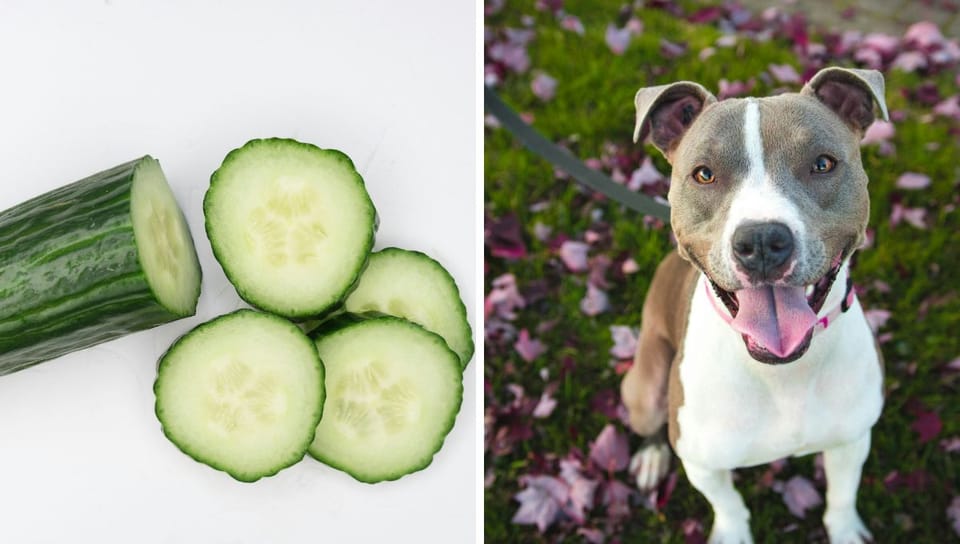Cucumbers and Canines: A Crunchy Comedy of Startling Surprises!

Dogs and cucumbers might seem like an odd pairing at first glance, but this combination has garnered a lot of attention and curiosity among pet owners. From viral videos of dogs reacting to cucumbers to questions about the safety of feeding this vegetable to our canine companions, there's a lot to unpack.
In this informative article, we'll explore the relationship between dogs and cucumbers, nutritional benefits, potential risks, and how to safely introduce cucumbers into your dog's diet.
Key Takeaways:
- Cucumbers can be a healthy, low-calorie treat for dogs, but they should be introduced into their diet cautiously.
- Understanding a dog's nutritional needs and potential risks associated with cucumbers is crucial for their well-being.
- Always consult with a veterinarian before making significant changes to your dog's diet.
Nutritional Benefits of Cucumbers for Dogs
Cucumbers are known for being a low-calorie snack with high water content, which can be beneficial for dogs, especially those needing to manage their weight. They are also a source of vitamins K, C, and B1, as well as potassium, copper, magnesium, and biotin. These nutrients can contribute to the overall health of your dog by supporting their immune system, skin, and coat health.
However, it's important to remember that dogs have different nutritional requirements than humans. While cucumbers can offer some nutritional benefits, they should not replace a balanced diet tailored to a dog's specific needs. Always consider cucumbers as a supplement to their regular meals rather than a staple.
Potential Risks and Considerations
While cucumbers are non-toxic to dogs, there are a few considerations to keep in mind. The hard skin and seeds of a cucumber can be difficult for some dogs to digest, especially if they have a sensitive stomach. It's best to peel cucumbers and remove the seeds before offering them to your pet. Additionally, introducing any new food into your dog's diet should be done gradually to avoid gastrointestinal upset.
Another concern is the choking hazard that cucumbers may pose, particularly for small dogs or those that tend to gulp their food without chewing properly. Always cut cucumbers into bite-sized pieces appropriate for your dog's size to minimize this risk.
How to Safely Introduce Cucumbers to Your Dog's Diet
When introducing cucumbers to your dog's diet, start with a small piece to see how they react. If there are no adverse effects, such as an upset stomach or allergic reaction, you can gradually increase the amount. It's also a good idea to consult with your veterinarian before adding cucumbers or any new food to your dog's diet, as they can provide personalized advice based on your dog's health and nutritional needs.
Remember, treats like cucumbers should not make up more than 10% of your dog's daily caloric intake. This helps ensure that your dog maintains a balanced diet and receives all the necessary nutrients from their primary food source.
The Viral Phenomenon: Dogs and Cucumbers
The internet is awash with videos of dogs reacting to cucumbers, often with surprise or fear. This has led to a viral trend where owners place cucumbers behind their unsuspecting dogs to capture their reactions. While these videos can be amusing, it's important to consider the potential stress this can cause to pets. Startling a dog with a cucumber—or anything else—can lead to anxiety and stress, which is not conducive to their overall well-being.
Instead of trying to replicate these viral moments, focus on creating a positive experience for your dog when introducing them to cucumbers or any new food. Positive reinforcement, such as praise and gentle encouragement, can make trying new foods a fun and rewarding experience for your dog.
Cucumbers as a Hydration Boost
Cucumbers are made up of about 95% water, making them an excellent source of hydration for your dog, especially during hot weather. If your dog is reluctant to drink enough water, offering them cucumber slices can help increase their fluid intake. This is particularly useful for dogs that are active or those that spend a lot of time outdoors in the heat.
However, cucumbers should not replace your dog's regular water consumption. Always ensure that your dog has access to fresh, clean water at all times. Cucumbers can be a supplemental source of hydration but are not a substitute for water.
Summary
Cucumbers can be a healthy treat for dogs when introduced properly and in moderation. They offer hydration and essential nutrients while being low in calories. However, it's important to consider the potential risks, such as choking hazards and digestive issues, and to consult with a veterinarian before making dietary changes. Remember to prioritize your dog's well-being over internet trends and to use positive reinforcement when introducing new foods.
FAQ Section
Q: Can dogs eat cucumbers every day?
While cucumbers are safe for dogs, they should be given in moderation as a treat, not as a daily diet staple. Always consult with your veterinarian to determine the appropriate amount for your dog.
Q: Are there any dogs that shouldn't eat cucumbers?
Dogs with known food sensitivities or digestive issues should be cautious when introducing cucumbers. Always start with a small amount and monitor your dog's reaction.
Q: How should cucumbers be prepared for dogs?
Cucumbers should be washed, peeled, and seeds removed to prevent any digestive issues. Cut them into bite-sized pieces appropriate for your dog's size to avoid choking hazards.
